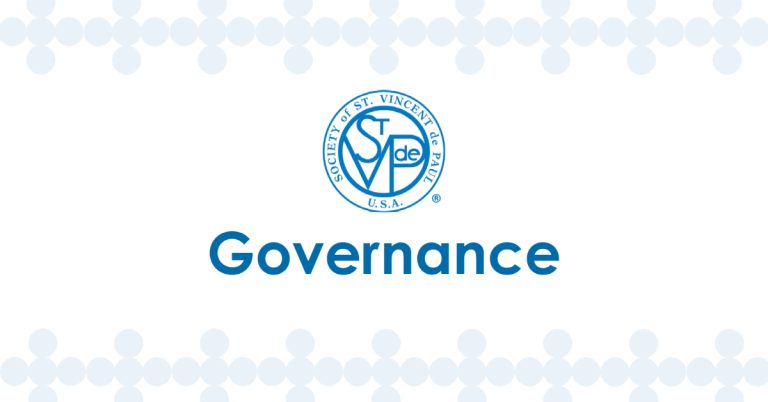FULL DISCLOSURE (TRANSPARENCY)
Council finances should be fully disclosed to all members of the Council on a regular basis. They can be disseminated to all Vincentians through Council members or a regular mailing. The frequency depends somewhat on the extent of the Council’s financial activities, but no less than once a quarter. As with Council action items financial reports should be furnished to Council/Board members well before the Council/Board meeting.
There should be some basic training for all Council/Board members on how to read and understand a Balance Sheet and a Profit and Loss Statement. This needs to be given periodically as new Council/Board members begin their term.
AUDITS
If the Council has stores and/or special works, a full audit by a CPA or accounting firm should be accomplished annually. There are three levels of audits: Compilation, Review, and Full Audit. Select the one appropriate to the size and complexity of your Council. Those smaller Councils that have no stores or special works may plan and execute an informal audit. In any case, a Council audit should be performed annually.
A copy of the audit report should be given to each Council/Board member and discussed at the Council/Board meeting. Results of the audit should be made known to all subsidiary Councils and Conferences. Pay particular attention to any changes suggested to operations or record keeping that are in the report. The Council is accountable to its subsidiaries and upper Councils for the results of the audit. Statements on the audit of impropriety must be addressed before the next audit.
BUDGETS
A budget should be developed each year. The Council financial report should show how closely the operation is tracking with the budget each month. Any significant variance that develops should be dealt with in an established “process” manner. If the need for correction persists, action is required by the Chief Executive Officer/Executive Director, Board, or Council. Expenses can be well predicted. It is the income that is uncertain. Don’t fall into the trap of balancing the budget by simply increasing the expected income.
The budget should be formally approved by the Council. It should be treated as a governance document that the Chief Executive Officer/Executive Director and staff must operate within. However, staff should have the latitude to make decisions within the limits of the budget without exceeding those limits.
INSURANCE – CONSIDERATIONS
Adequate insurance coverages and limits should be maintained. It should include Directors and Officers Liability, Employee Practices, and Sexual Abuse coverage to protect the Council in addition to the normal coverages of Property, Liability, Vehicle, and etc. The Liability Insurance should include coverage for all members and volunteers. Annual evaluations should be made of all insurance policies.
An annual update of values should be done on all property insurance. Experts in appraisal, construction, banking, or insurance can be called upon to assist. The cost of insurance is extremely low in comparison to an uninsured or underinsured claim. Determine the cost to replace/rebuild with outside contractors, not the market value of the property.
In most cases of Council operations, limits of $1,000,000 would be considered inadequate. Establish limits with the advice of experts.
FUNDRAISING
Fundraising, as a general rule, is a long-term project. There may be various short-term fundraising projects that are planned but they should be part of a large effort. Develop a fundraising plan and work the plan over a long period of time. Adjust the plan as needed but the most important aspect is to make it a day to day process at all times. Don’t rely on a few resources; continue to search out new avenues to finance our work. The old tried and true may have been discovered by many other nonprofits resulting in less income than in the past.
RESERVE FUNDS
Establish a reserve fund if the Council has works that require payroll, bank payments or any other ongoing expenses. Decide how long a period of operation you would need to fund in case of loss of the normal source of funding or some operational disaster. This gives you time to adjust operations in case of unexpected losses in any year.
The Manual suggests 50% of annual budget (a six-month reserve). This may be too much depending on ongoing commitments and time to shut down various works if a critical situation arises. If financial results are negative, take corrective action as soon as possible to avoid invading the reserve fund.
Conferences and Councils with no extended obligations need little or no reserves. The money belongs to God’s poor. We are stewards of those funds.
SOLIDARITY
The Rule permits Councils at each level to assess its subsidiaries a solidarity contribution to help offset its cost of operations. This starts at the Council General International (CGI) and goes to each level beneath: National Council, Diocesan Council, District Council, and Conference. This is an obligation that each subsidiary must fulfill.
CGI assesses an annual solidarity contribution from National Councils. The National Council assesses an annual contribution from its Diocesan Councils, District Councils, and Conferences. Diocesan Councils can assess periodic contributions from its District Councils and Conferences. District Councils can assess periodic contributions from its Conferences.
The National Council makes its assessment in October of each year (the beginning of the fiscal year). It assesses to Councils and Isolated Conferences in each diocese. The Councils are expected to make the solidarity contribution. They are then expected, if they choose, to collect the appropriate portion of the contribution from their subsidiary Councils, Conferences, stores, and special works.

